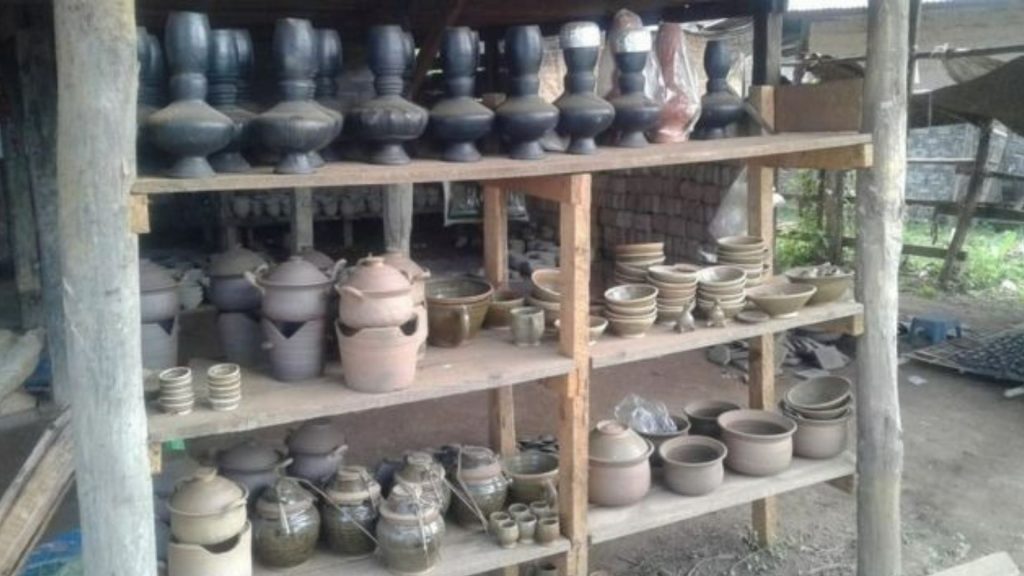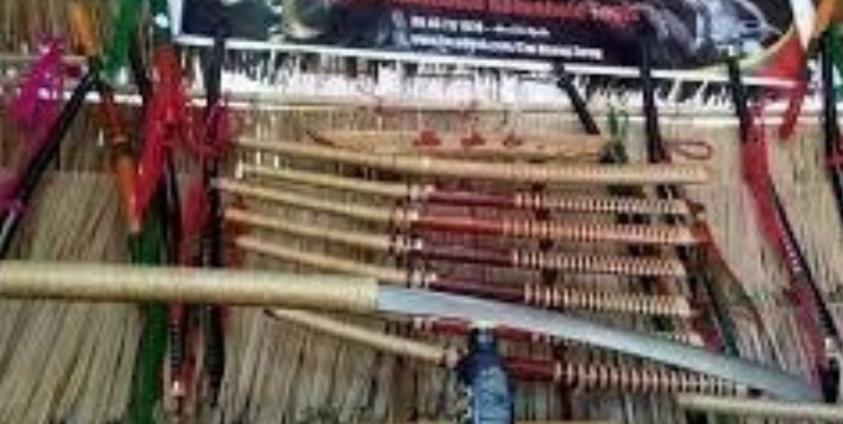Myanmar has faced the impact of Covid-19 pandemic during the past two years like the rest of the countries in the world, and the economic and well-being of Myanmar civilians have been severely affected.
As a result, some of the traditional handcrafted legacy businesses in Shan State are struggling to continue their operations.
Apart from the Covid-19 pandemic, the 1st February 2021 coup and the conflicts between the ethnic armed groups in the region were another factor that forced the locals to be internally displaced. It has been very hard for the residents to have a sufficient income and to make a living.
Mong Kung is a town in Southern Shan State which produces various kinds of traditional handmade products for generations.
Mong Kung paper or Shan paper, pottery, and traditional Shan sword/knife are among the most famous traditional handcrafted products of Mong Kung town.
The Almost Die Out Shan Traditional Paper Business
Shan paper was mainly used for the religious rituals and culture and literature purpose, such as decoration and script writing, among Shan tribe in the past.
Because of the changes in the modern day, the use of Shan paper is now significantly decreased, and there is almost none who is producing the paper these days.
“This business is not profitable enough to feed our family in the long run,” an elder Mong Kung native told SHAN.
The Shan paper was used to write the old Shan script, to decorate the interior of a house, and to use in the religious festivals.
The paper was mostly produced at Tong Lao village, Mong Kung town, Southern Shan State.
However, due to the Covid-19 pandemic and the Shan ethnic armed groups gun fight in Mong Kung town areas in 2021, the natives had to flee their homes.
“The ethnic armed groups are controlling this area, so we cannot live freely and we feel unsecure. We cannot travel freely from Tong Lao village to Mong Kung city like in the past. We have to be alert all the time when we travel,” Sai Khur Sin, a Mong Kung resident told SHAN.
According to the villagers, the traditional Shan paper market is shrinking and almost cease to exist. The use of the traditional paper for the religious festivals has also decreased enormously. Most people are now buying more of the readymade product coming from somewhere else, and the locally produced paper is almost vanishing from the market.
“Locals no longer use the traditional paper for the religious rituals, they are using other readymade materials instead because it is more convenient,” the above Mong Kung native Sai Khur Sin added.
He also said that it is important for the locals to assist one another in order to preserve this local legacy Shan traditional handmade paper or Mong Kung paper; else, it will be vanished. Currently, there is no market for the paper, almost no one is relying on this business, and no young generations who are interested to learn about this traditional Shan paper production.
Shan traditional handmade paper or Mong Kung paper is not the only one which is on the verge of vanishing, another well-known pottery business is facing the same fate.

Mong Kung Pottery Business
Even though the locally produced pottery such as dishes, cups, pots, etc. were preferred and used widely in the past, the imported utensils from China and Thailand are dominating the market nowadays.
As a consequence, those who are relying on pottery business in Mong Kung are out of business, and very few of them are continuing the production. The current pandemic and political instability are another driving force for them to seek alternative careers.
“Almost all of the adult and young potters have left their job and gone abroad to find a better job opportunity, only some elder potters remain,” a Mong Kung resident Nang Swe told SHAN.
The Mong Kung pottery products were distributed and sold nationwide. However, most of the local potters have gone abroad to seek for alternative careers, and the remaining potters are facing all kind difficulties to continue the production because of the impact of Covid-19 and political crisis.
Additionally, the firewood, the main material used in the pottery processing, is now depleted. It is also not safe for the villagers to collect the firewood in the jungle because of the ongoing gun fights between the armed groups.
“It is not possible to collect the firewood because of the gun fight and land mines set up by the ethnic armed groups,” Nang Swe disappointedly expressed the potters’ difficulties to SHAN.
Firewood is used in the heating process of the pottery. The pottery products from Ho Na village, Mong Kung township are in good qualities, and some of them are exported to other countries in the past.
Due to the political instability, the transportation and market have been disrupted.
“Our pottery compound were filled with customers near and far in the past, our pottery products were quite famous. No one dares to travel to our village to buy the products and we also cannot go and sell our items elsewhere. We could only sell some in the village. There are many unsold finished products in our compound now,” a woman from Ho Na who is in pottery business told SHAN.
The ethnic armed groups conflicts started in the mid 2021 and the fight is still going on from time to time until today.
As a result, there is a high risk for the natives to step on land mines or to be stuck in the middle of the gun fight when roaming in the jungle to get firewood. Transportation is another problem; therefore, tons of finished products pile up in the pottery compound.
Apart from the Mong Kung traditional paper and pottery business, Mong Kung blacksmith business, particularly knife and sword, is one of the most famous handmade products in Shan State.
“The sword and knife produced by the blacksmith today is not as good quality as in the past. It could be because of quality of iron, or it could also be the technical knowhow. Today’s Humngai sword and knife quality is not comparable to the old ones, the good ones are very rare nowadays,” an elder Mong Kung native told SHAN.
There was a saying in the Shan community that, “When we say Humngai, we see its sword. When it comes to sword, Humngai comes to mind first”. Humgnai is famous for its best quality sword and knife in Shan State. However, its quality is significantly deteriorated these days.
The blacksmiths used the iron from the cars’ torsion bar to produce Humngai sword and knife in the past. However, the lower quality iron is used nowadays which caused the loss of customers interest in the once famous Humngai sword and knife.
“These days people often misused the name Humngai and sell the bad quality swords. And sword is a kind of weapon and the authority does not like to see people producing and selling it publicly. Some people do not dare to produce and sell it openly,” a Mong Kung resident Lone Aung Thein told SHAN.
As this was a traditional symbol product of Humngai village, Mong Kung town, the locals are worried that this Shan traditional handmade product will disappear from the area due to many factors.
“Of course we worry about this because less and less people are producing and buying this legacy handmade product,” Lone Aung Thein added.
Some of the locals urge to promote the use of traditional handmade product to maintain and preserve one of the tradition and symbolic products of Shan State.
“I would like to urge people to continue producing this traditional handcrafted product with the consistent quality so that we can preserve this custom and tradition,” a woman who lives in Mong Kung town told SHAN.
If one lost its custom and tradition, there is a risk of ethnicity or identity extinction. It is important to preserve the old legacy in order to maintain the existence of one’s identity. The locals are worried that Mong Kung’s symbolic and traditional businesses such as Shan paper, pottery, and blacksmith businesses would disappear one day.
The current Covid-19 pandemic and political situation are another driving force that add to the risk of disappearance of such local tradition and practice. Also, a lack of interest from the younger generation to take over such traditional businesses is another main concern. In the long run, it will be very hard to keep it from vanishing.
Another Mong Kung resident, Sai Khur Sin, also remarks that those traditional handmade products are the symbolic items of Mong Kung town, and locals were very proud of that. It would be a great lost to let it die out.







